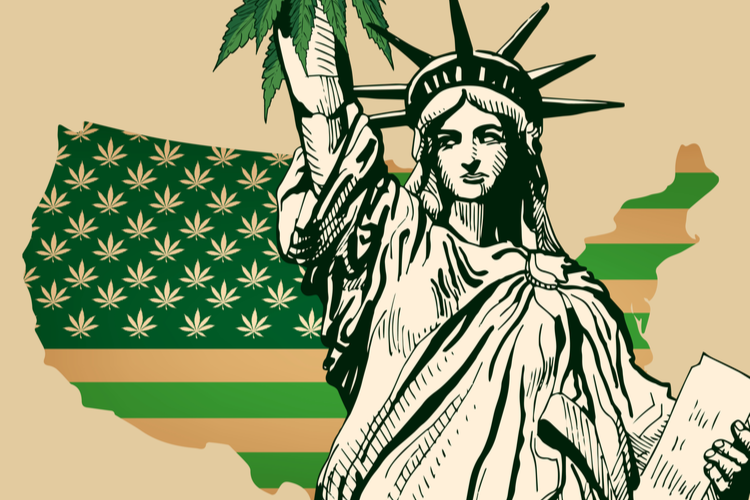For many Americans, cannabis is the bright new future of medicine, promising them gentle, safe, and sustainable relief from many chronic symptoms and conditions. But only a few short years ago, cannabis was Public Enemy #1 (and of course, it’s still illegal under federal law). Cannabis medicine didn’t get from zero to hero overnight, and it didn’t do it without a heroic and sustained effort from some early pioneers. In today’s post, we’ll explore the history of the National Organization for the Reform of Marijuana Laws, better known as NORML. Founded, incredibly, a half-century ago, NORML has risen to become perhaps the most identifiable and respected face of the cannabis legalization movement. Here’s its story.
NORML: Humble Beginnings In an Uncertain Time for Cannabis

In 1970, Keith Stroup was an ambitious young lawyer from Illinois. Having succeeded in avoiding the Vietnam War draft, he was searching, as he put it, “for an issue to call his own.” Taking a page from groundbreaking consumer safety lawyer Ralph Nader—who had come to prominence with the 1965 publication of Unsafe at Any Speed, a searing indictment of the American automobile industry—Stroup decided that the “consumer issue” he would adopt would be the legalization of cannabis.
Today, NORML focuses on advocating for access to safe, convenient, and affordable cannabis by all legal consumers. But it’s difficult to convey how much suspicion cannabis aroused 50 years ago. Though it was already the most popular illicit drug in America, cannabis was viewed by law enforcement agencies as nothing less than a mortal threat to America. Few establishment figures wanted to back or be associated with NORML, so Stroup approached Playboy magazine founder Hugh Hefner for support. His Playboy Foundation first kicked in $5,000, which quickly ballooned to $100,000.
Within a few years, NORML was the highest-profile advocacy group trying to change America’s attitude to cannabis. In its first decade, it succeeded in persuading 11 states to decriminalize minor cannabis offenses. And in those that didn’t, penalties for cannabis use were significantly reduced
But Stroup and NORML soon suffered a setback when the two parted ways after the organization had become close with the Carter White House. Stroup, outraged that President Carter’s drug advisor, Peter Bourne, refused to support a bill banning the use of the harmful pesticide paraquat on Mexican cannabis fields. In retaliation, Stroup told a reporter that Bourne had done cocaine at a recent NORML Christmas party. Bourne was fired, and Stroup was ushered from his position as executive director.
NORML: A More Mature Approach to Legalization

The 1980s saw a major pushback to drug decriminalization efforts. Under Republican presidents Reagan and Bush, the federal government doubled down on the disastrous War on Drugs, which unduly targeted communities of color, helped fuel a national prison crisis, and did little to actually curb illicit drug use.
But efforts to get states to recognize the medical benefits of cannabis began to bear fruit in 1996 when California passed the landmark Prop 215, which decriminalized medical cannabis in the country’s most populous state. By then, NORML founder Keith Stroup had rejoined the organization. He would continue to serve as its executive director until 2005. Today, NORML continues to advocate strong support for safe access to medical cannabis, arguing that:
“Of all the negative consequences of marijuana prohibition, none is as tragic as the denial of medicinal cannabis to…patients who could benefit from its therapeutic use.”
NORML and The Cannabis Advocacy Program

One of NORML’s latest efforts has been to lay the groundwork for the next generation of cannabis advocates. The Cannabis Advocacy Program is a response to the recognition that, despite its strong economic prospects, the cannabis industry is in limbo.
While the industry currently serves roughly 3 million medical cannabis patients—and earns nearly $2 billion in annual tax revenue—the path to full federal legalization won’t come without experienced and knowledgeable advocates to help lead the way. What’s more, even greater effort is needed to enact badly needed justice system reforms such as the automatic expungement of records and sentences for prior cannabis-related criminal offenses.
Today, NORML’s ultimate goals—eliminating criminal penalties for the responsible adult possession and use of cannabis, and building a safe and regulated universal cannabis market—are closer than ever. Even if you believe cannabis should only be legal for medical use, it’s no stretch to suggest you still owe a debt of gratitude to the tireless advocacy of NORML for helping bring cannabis medicine to where it belongs: With the people who need it.
